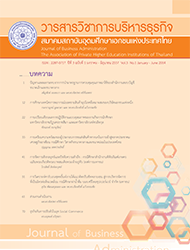การวิเคราะห์คาร์บอนฟุตพริ้นท์ภายใต้แนวคิดกรีนซัพพลายเชน สู่การบริหารจัดการ ที่เป็นมิตรต่อสิ่งแวดล้อม กรณีศึกษา ฝาน้ำดื่ม บมจ.ศรีไทยซุปเปอร์แวร์ จำกัด (มหาชน)
Keywords:
คาร์บอนฟุตพริ้นท์, B2B (การทำธุรกิจการค้าระหว่างหน่วยงานธุรกิจกับหน่วยธุรกิจ), กรีนซัพพลายเชน, วัฏจักรชีวิตของผลิตภัณฑ์ (LCA), ผลิตภัณฑ์ฉลากเขียว การบริหารจัดการที่เป็นมิตรต่อสิ่งแวดล้อม, Carbon Footprint, B2B, Green supply chain, Life Cyele AssessmentAbstract
บทความนี้เป็นการศึกษาวิเคราะห์ คาร์บอนฟุตพริ้นท์ (Carbon Footprint) ของผลิตภัณฑ์ฝานน้ำดื่มภายใต้แนวคิดวัฎ จักรชีวิตจักรผลิตภัณฑ์ และ B2B (Business-to-Business; การทำธุรกิจการค้าระหว่างหน่วยงานธุรกิจกับหน่วยธุรกิจ) ผลการศึกษาแสดงให้เห็นว่าปริมาณการปล่อยก๊าซเรือนกระจกเทียบเท่า (Equivalent Greenhouse Gas) ฝานน้ำดื่มที่มีนน้ำหนัก 1.45กรัม (1 ฝา) จะมีค่าคาร์บอนฟุตพริ้นท์เทียบเท่าอยู่เท่ากับ 8.46 g Co2-eq โดยที่สัดส่วนระดับคาร์บอนฟุตพริ้นต์เพื่อการนำเข้าวัตถุเพื่อการผลิตจะอยู่ในระดับสูงสุดเท่ากับ 7.96 g Co2-eq (คิดเป็น 94.12%ของระดับคาร์บอนด์ฟุตปริ้นทั้งหมด) รองลงมาคอืกระบวนการผลิต ซึ่งอยู่ที่ระดับ 0.50 g Co2-eq (คิดเป็น 5.88% ของระดับคาร์บอนฟุตพริ้นทั้งหมด) ผลการศึกษาได้เสนอแนวทางการประยุกต์การบริหารจัดการแบบกรีนซัพพลายเชน ด้านการบูรณาการการบริหารจัดการสิ่งแวดล้อมและการบริหารห่วงโซ่อุปทาน (LCA) เพื่อเสนอแนวทางการลดปริมาณการปลดปล่อยก๊าซเรือนกระจกผลิตภัณฑ์ฝานน้ำดื่ม จากระดับ 8.46 g Co2-eq ลดลงเหลือ 2.4 g Co2-eq (หรือคิดเป็น 74% ของการปลดปล่อยทั้งหมด) นอกจากนั้นการศึกษาได้เสนอแนวทางการวิคราะห์และการประยุกต์เพื่อขึ้นทะเบียนฉลากคาร์บอน (Carbon Label) เพื่อส่งเสริมกระบวนการบริหารจัดการผลิตที่เป็นมิตรต่อสิ่งแวดล้อม และความสามารถในการแข่งขันของอุตสาหกรรมที่เกี่ยวข้องกับการผลิตฝานน้ำดื่ม
Carbon Footprint Analysis under the Concepts of Green Supply Chain towards Environmentally Managerial Approach: A case study of Water Closure; Srithai Superware PLC.
Grounded on the Life Cycle Assessment (LCA) conceptual ideas and B2B (Business-to-Business)managerial approach, this study analyzes the level of carbon footprint, concerning on carbon equivalent (CO2-eq), of a water closure from a manufacturing process. Results obtained from the study indicated that total carbon equivalent of a piece of water closure is calculated at the level of 8.46 g Co2-eq. In which, are from the raw material acquisition processes 7.96 g Co2-eq (or 94.12% of total carbon footprint), and from the production process 0.50 gCo2-eq. (or 5.88% of total carbon footprint). In order to reduce the level of carbon footprint, this study suggests a method of integrating the concepts of green supply chain concepts with LCA for the manufacturing process of a water closure. And hence, the company has a room to curb the carbon equivalent from 8.46 gCo2-eq to 2.4 gCo2-eq (or 74% of total carbon footprint). In addition, this manufacturing process would lead to initiate the Carbon Label of a product and as company’s environmentally managerial approach.
Downloads
How to Cite
Issue
Section
License
บทความที่ลงตีพิมพ์ในวารสารวิชาการบริหารธุรกิจ สมาคมสถาบันอุดมศึกษาเอกชนแห่งประเทศไทยต้องเป็นบทความที่ไม่เคยได้รับการตีพิมพ์เผยแพร่ หรืออยู่ระหว่างการพิจารณาตีพิมพ์ในวารสารอื่นๆ การละเมิดลิขสิทธิ์เป็นความรับผิดชอบของผู้ส่งบทความโดยตรง


